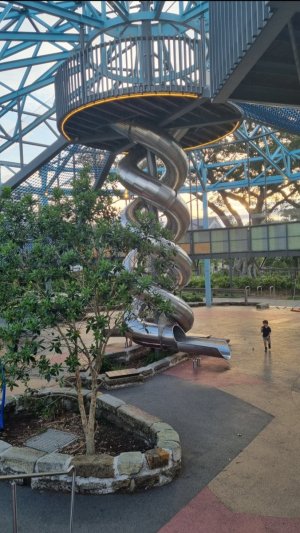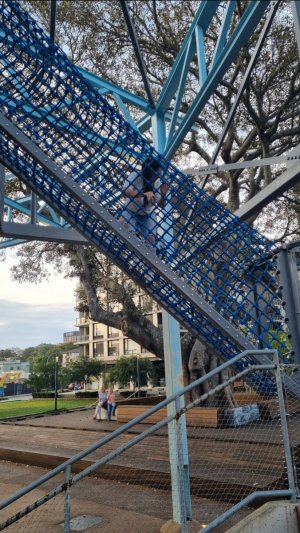Revealed: How backpackers are wiping out this Sydney suburb–locals are in shock!
By
- Replies 6
Once a bustling hub of activity and a beacon for property investors worldwide, the Sydney suburb of Randwick is now facing a crisis that has left its streets lined with vacant storefronts and its local economy in peril. The culprit, according to distressed business owners and residents, is an unexpected one: the influx of backpackers, coupled with skyrocketing rent prices and a changing urban landscape.
In 2017, Randwick was lauded as one of the top ten most attractive suburbs globally for affluent property buyers. Fast forward to today, and the picture is starkly different. Belmore Road, the main shopping artery of Randwick, is now marred by 22 empty shop fronts, a silent testament to the area's decline.
Yunus Chen, the proprietor of Tek’s Gifts & Things for over two decades, has witnessed the transformation firsthand. With an annual rent of $60,000, he's feeling the squeeze of the high costs that are driving businesses away. 'There is no business in Randwick,' Chen laments. He points to the rise of backpackers who, while bringing a vibrant cultural mix to the area, often lack the disposable income to support local shops. 'They’re not going to buy things for their homes,' he explains, highlighting that only certain businesses, like pubs, seem to thrive in the current climate.
Shaney Ung, the current owner of Simon’s Pharmacy, a fixture in Randwick for 70 years, echoes Chen's concerns and adds another layer to the problem: parking. She recounts how the northern end of Randwick once had ample parking, but that space has since been repurposed for housing development. The local council's refusal to even allow a disabled parking spot outside her pharmacy is indicative of the challenges businesses face.
Graeme Smedley, a local auctioneer and real estate agent, quantifies the issue, estimating that one in ten businesses have shut down in the last two years. He criticises the council's lack of a coherent plan for Randwick's future, observing that new independent businesses often don't last a year. 'You could shoot a gun down the main street and not hit anyone after 5 pm. It’s just dead,' he says, painting a grim picture of the suburb's decline.
The recent closure of the ANZ bank branch on Belmore Street is seen as a significant blow, signalling a broader trend of commercial downturn despite residential prices holding strong. Smedley fears that the suburb may never recover its former vibrancy, especially in the wake of the Covid-19 pandemic and the ongoing cost-of-living crisis.
In response to the outcry, a spokesperson for Randwick City Council has acknowledged the slowdown in business, attributing it to a shift towards online shopping and reduced consumer spending. The council insists it supports local businesses and is committed to transforming high streets into destinations that attract visitors and stimulate economic activity.
As the Seniors Discount Club, we understand the importance of community and the value of local businesses in enriching our lives. The situation in Randwick serves as a cautionary tale of how demographic shifts and economic pressures can reshape our neighbourhoods, often with unintended consequences.

We invite our readers to share their thoughts and experiences. Have you noticed similar trends in your area? What do you think can be done to revive local economies and support small businesses? Join the conversation and let us know in the comments below.
In 2017, Randwick was lauded as one of the top ten most attractive suburbs globally for affluent property buyers. Fast forward to today, and the picture is starkly different. Belmore Road, the main shopping artery of Randwick, is now marred by 22 empty shop fronts, a silent testament to the area's decline.
Yunus Chen, the proprietor of Tek’s Gifts & Things for over two decades, has witnessed the transformation firsthand. With an annual rent of $60,000, he's feeling the squeeze of the high costs that are driving businesses away. 'There is no business in Randwick,' Chen laments. He points to the rise of backpackers who, while bringing a vibrant cultural mix to the area, often lack the disposable income to support local shops. 'They’re not going to buy things for their homes,' he explains, highlighting that only certain businesses, like pubs, seem to thrive in the current climate.
Shaney Ung, the current owner of Simon’s Pharmacy, a fixture in Randwick for 70 years, echoes Chen's concerns and adds another layer to the problem: parking. She recounts how the northern end of Randwick once had ample parking, but that space has since been repurposed for housing development. The local council's refusal to even allow a disabled parking spot outside her pharmacy is indicative of the challenges businesses face.
Graeme Smedley, a local auctioneer and real estate agent, quantifies the issue, estimating that one in ten businesses have shut down in the last two years. He criticises the council's lack of a coherent plan for Randwick's future, observing that new independent businesses often don't last a year. 'You could shoot a gun down the main street and not hit anyone after 5 pm. It’s just dead,' he says, painting a grim picture of the suburb's decline.
The recent closure of the ANZ bank branch on Belmore Street is seen as a significant blow, signalling a broader trend of commercial downturn despite residential prices holding strong. Smedley fears that the suburb may never recover its former vibrancy, especially in the wake of the Covid-19 pandemic and the ongoing cost-of-living crisis.
In response to the outcry, a spokesperson for Randwick City Council has acknowledged the slowdown in business, attributing it to a shift towards online shopping and reduced consumer spending. The council insists it supports local businesses and is committed to transforming high streets into destinations that attract visitors and stimulate economic activity.
As the Seniors Discount Club, we understand the importance of community and the value of local businesses in enriching our lives. The situation in Randwick serves as a cautionary tale of how demographic shifts and economic pressures can reshape our neighbourhoods, often with unintended consequences.
Key Takeaways
- Randwick, once a highly desirable Sydney suburb, has been labelled 'dead' by locals and business owners due to various issue,s including an influx of backpackers and high rent prices.
- The suburb has seen an increase in empty shop fronts, with local business owners citing the backpacker presence, a lack of parking, and the cost of living crisis as factors impacting trade.
- Local business owners and real estate agents call for council action and a future vision to revitalise Randwick, lamenting the loss of business and suggesting that online shopping and economic pressures further exacerbate the problem.
- Randwick City Council asserts that it supports local businesses and aims to transform high streets into destinations, highlighting efforts to sustain Randwick's economy and community character amidst challenges.
Last edited by a moderator:










